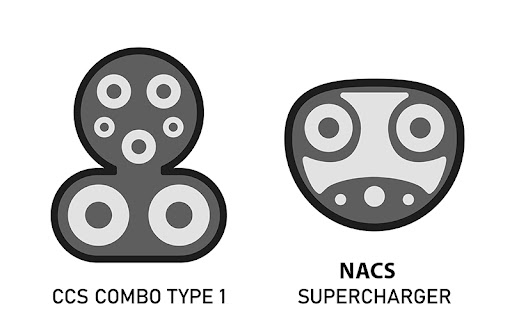
Partnership Among 7 Automakers to Boost EV Charging Infrastructure
Range anxiety, the fear of running out of electricity on a road trip, keeps many people from jumping into electric vehicles (EVs). But now that EV sales are breaking records, competition among charging companies is closing the gap. It will soon be easier to find a charge.
Seven major automakers recently unveiled a collaborative initiative to establish an extensive EV charging network with 30,000 charging stations throughout North America. BMW Group, General Motors, Honda, Hyundai, Kia, Mercedes-Benz Group, and Stellantis NV announced a joint venture to enhance the convenience, accessibility, and compatibility of EV charging stations. This yet-to-be-named network has the potential to compete with Tesla Superchargers and leverage the Biden administration EV charger subsidies.
The new charging network will be compatible with any all-electric or plugin hybrid electric vehicles from any automaker with Combined Charging System (CCS) or Tesla’s North American Charging Standard (NACS) charging ports. These EV chargers will be powered 100% by renewable energy, and the first locations are expected to be operating in the summer of 2024. The charging facilities will often feature canopies and other amenities, such as bathrooms, stores, and restaurants nearby or in the same complex.

The plan will utilize subsidies for creating a national network of 500,000 EV chargers by 2030. The Bipartisan Infrastructure Law allocated $7.5 billion for EV charging and aims to make charging stations available along highways for long-distance trips.
How this new charging network can help with EV adoption
There are currently more than three million EVs and over 130,000 public chargers throughout the U.S. Yet, many of these are level II chargers and not fast chargers, requiring hours if a battery is significantly discharged. Unfortunately, consumer confidence in electric vehicles is relatively low, mainly due to concerns related to vehicle charging, and many EV owners are unhappy with the current public charging options.
The J.D. Power 2023 U.S. Electric Vehicle Experience Public Charging Study reveals dissatisfaction among EV drivers with public charging infrastructure. “The declining customer satisfaction scores for public charging should be concerning to automakers and, more broadly, to public charging stakeholders,” said Brent Gruber, executive director of the EV practice at J.D. Power.
“The availability of public charging stations is still a critical obstacle, but it isn’t the only one. EV owners continue to have issues with many aspects of public charging, as the cost and speed of charging and the availability of things to do while waiting for their vehicle to charge are the least satisfying aspects. At the same time, the reliability of public chargers continues to be a problem. The situation is stuck at a level where one of every five visits ends without charging, the majority of which are due to station outages.”
Electrifying transportation requires making publicly available EV chargers widely available, particularly in urban areas and along major travel routes. Many potential EV drivers have range anxiety and are concerned they cannot travel long distances conveniently, although the range of many new EVs has increased significantly in recent years. In fact, there are now many EV models with well over 200 or even 300 miles of range.
Likewise, many apartment dwellers cannot charge at home. Both issues can be addressed by making public rapid EV chargers will continue to become more widely available at convenient locations.
More EVs to Become Compatible with Tesla Superchargers
Another recent announcement from seven automakers could also significantly impact the U.S. charging landscape. Ford, General Motors, Honda, Mercedes, Nissan, Rivian, and Volvo have recently announced they will switch to Tesla’s NACS charging port and make the Tesla Supercharger network available to customers starting in 2024.
Most EVs in the United States use the CCS charger plug, but that trend is changing. Thus, Tesla’s robust EV charging network will be accessible to many more electric vehicles, but the companies haven’t announced information related to the cost for non-Tesla vehicles.
Tesla’s Supercharger is the largest rapid EV charging network, with over 45,000 chargers in the U.S. The J.D. Power study shows that Tesla owners are relatively happy with the Supercharger network, but their satisfaction declines considerably when using chargers outside the network.
However, Superchargers have historically only been compatible with Tesla vehicles, and the user experience may change when the network is opened up to non-Tesla drivers. It’s difficult to predict if non-Tesla drivers will have the same smooth customer experience when the network becomes available to them.
New EV Charging Network Could Reduce Driving Range Concerns
Although many automakers are investing billions to design and manufacture EVs and increase vehicle range, the public charging infrastructure has lagged. However, the recent announcement from seven automakers will help mitigate this issue by installing 30,000 EV chargers throughout North America. The collaboration will help spread the costs among numerous companies and help boost clean energy adoption.
Services Marketplace – Listings, Bookings & Reviews